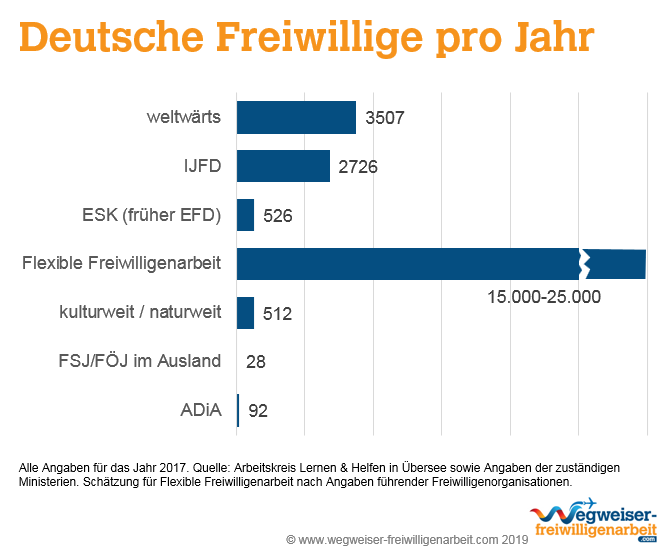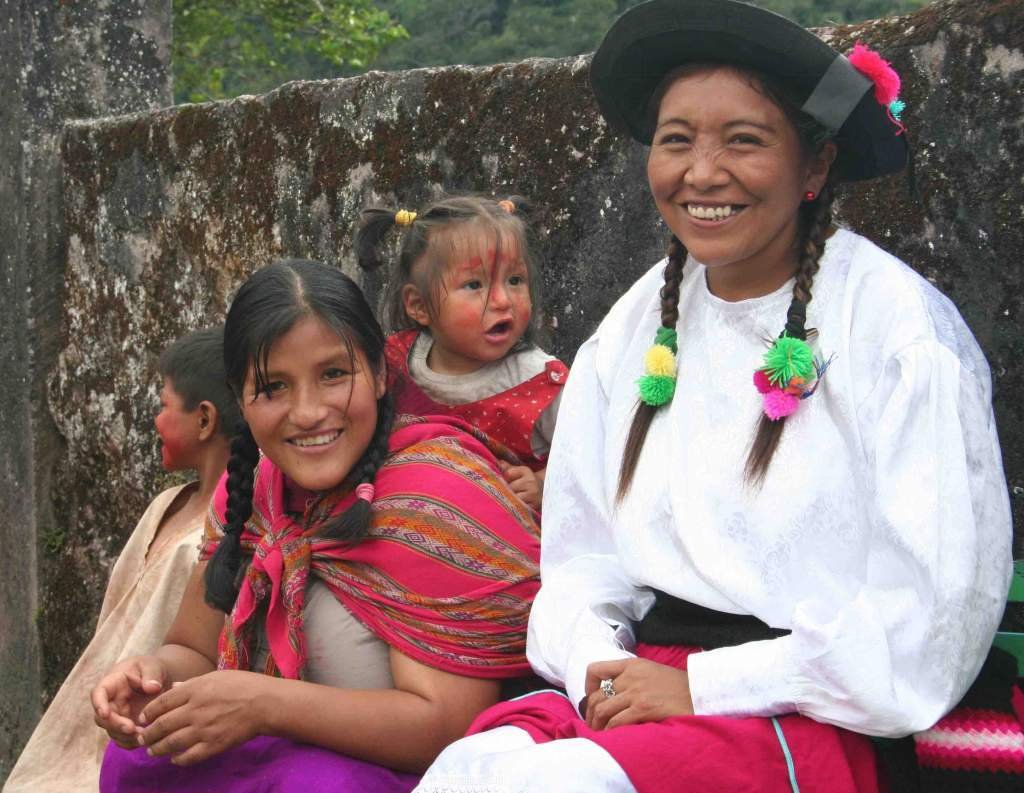The European Voluntary Service (EVS) not only offers volunteers high grants, but also an extensive project database with over 3,900 locations. B. in France, Great Britain, Spain or Italy. In addition, theoretically, any European aged 17-30 can participate, regardless of whether they are high school graduates or have no school leaving certificate. However, applying to EVS is usually even more complicated and time-consuming than to other international voluntary services such as weltwärts or IJFD. So that you don’t despair when looking for a job, we have put together a user manual for EVS. You will also find a comparison with other international volunteer services in our infographic and can choose the best alternative for you.

Table of Contents
The European Voluntary Service (EVS) compared to other voluntary services
As the name suggests, the European voluntary service was not hatched in Berlin but in Brussels. The aim of the program is to show solidarity and understanding of the EU citizens to promote in relation to their European neighbors. The fact that all young citizens of the EU and its partner countries, including Switzerland, should really be addressed at the EVS, immediately catches the eye: apart from the age restriction, there are no other requirements for participation. The EVS is theoretically open to young Europeans between the ages of 17 and 30. However, many projects still require a minimum age of 18 – a look at the more detailed description of the individual projects clarifies this.
Volunteers who work at weltwärts, across cultures & Co. have little or no chance of participating should be explicitly preferred in the EVS application process. Specifically, these are applicants
- without graduation
- with a secondary or secondary school leaving certificate
- with migration background
- with increased funding needs
We welcome this approach, because the groups mentioned above are actually underrepresented in international voluntary services. A look at the statistics shows, however, that the EVS cannot really keep its promise: In 2011, not a single volunteer without a school leaving certificate took part in the EVS, the proportion of volunteers with a secondary or secondary school leaving certificate was a meager 7%. Although IJFD (5%) and weltwärts (4%) were even less, it is difference so small that you can hardly speak of success.
In contrast to other public voluntary services, the official minimum duration for EVS is only 2 months. Anyone who thinks about completing an EVS in the UK, Ireland or France for 2-3 months during a bridging period (e.g. between high school and university) will still be disappointed: EVS projects with a short duration are the absolute exception and the average duration of participation is 9 months.

Anyone participating in the EVS can look forward to the highest public grants from all international voluntary services. The services include:
- Pocket money (depending on the country of use 50-145 €)
- At least 90% of travel expenses covered
- Accommodation and catering
- Assumption of vaccination and visa costs
- language course
Unlike almost all other volunteer services, the volunteers are not forced to set up a donor group to fund their job.

The way to the EVS position: Perseverance is required!
Participants in other volunteer programs such as weltwärts or IJFD can only dream of a financial framework such as the EVS. Perhaps that’s why the path to the EVS deployment site is so rocky. EVS students have to apply twice:
- With a sending organization that is supposed to help the volunteers in their search for a project and the bureaucratic process
- At a host organization abroad, where the volunteers pay the EVS
Here are the individual stages:
- Search for a sending organization and application
- Search for interesting projects abroad
- Application to the host organization
- Application for funding by the sending organization and approval process
Search for a sending organization and application
Volunteers first need a sending organization in their home country. Their main task is, nomen est omen, to send the participants to the country of assignment and to organize the stay abroad. Some also help with the search for a job or give tips on motivation letters.
So that you can also find these sending organizations, there is the EVS database. Here you select “Sending institution” under EVS accreditation type.
With 169 sending organizations, the database is very extensive in Germany alone. The search for a suitable sending organization (Sending organization) can take a long time, as they have limited capacity, are sometimes picky when it comes to selecting potential volunteers or only send volunteers to certain partner projects. In principle, other organizations look after all applicants and send to all project countries.
So if you are lucky, you will find it quickly and save yourself a tedious application. Most of the time, volunteers have to contact several sending organizations and may have to go through a real application process with the risk of being rejected.
In general, if you want to go abroad via EVS, you have to get up early. Potential participants should try to find a sending organization at least 8 months before leaving the country.
The search for an EVS project: Lost in the database
Future volunteers have two options when looking for EVS projects:
- Either you choose one of the partner projects of your sending organization and apply there, or
- they search for their desired project in the EVS database and only use the sending organization for the organizational processing.
Both have advantages and disadvantages: If you are flexible and want to save time, choose the first option. Volunteers rely on the experience of the sending organization with their "own" partner organizations and take on purchase, to have little choice in terms of target country and area of application.
But if you want to have a say in the matter of the target country or area of action, you have to take care of the project search yourself. As with the search of the sending organization, the project database is available for this. This time it is important to choose “Receiving institution” under EVS accreditation type.
Based on criteria such as:
you can view all projects that host volunteers here. You can e.g. filter by application deadline or start date, which simplifies the search.
However, potential volunteers usually cannot avoid reading through the individual project descriptions or writing to the sponsoring organizations in order to provide more detailed information, e.g. B. to get over the project duration or the tasks.
It is usually advisable to make a pre-selection based on the country of assignment or field of activity and to request further information from the host organization. Since experience has shown that only a part of the projects that are written to come back and some jobs are not filled every year, patience and perseverance are required.
If you do not count patience as one of your strengths, you can also come to the EVS position with a good deal of flexibility: Various German EVS sponsoring organizations have informed us on request that applicants who are not specified in the country of deployment, start and duration have significantly higher chances to have a job. Who e.g. Even less popular countries like Albania or Ukraine and not just England, Ireland and Spain will definitely find EVS places more easily.
But if you want to work with young people in France for exactly 3 months from July, for example, you will usually only find something with the providers of flexible volunteer work.
Applying to the host organization
EVS candidates are ultimately aimed directly at the host organizations (Host organization) to find out more about application deadlines and the general procedure. There is no uniform application procedure. Then you send your EVS application to the host organization, which usually consists of the following documents:
- curriculum vitae
- Motivation letter
- Application form from the respective sending organization
- possibly letters of recommendation (e.g. from the teacher, pastor or trainer)
Since the EVS is a European voluntary service and young people from all EU and partner countries can apply for jobs, there is of course international punching and stabbing for positions in the most exciting projects and most attractive project countries. The front runner in our samples was a host organization in Potsdam (i.e. in the immediate vicinity of Berlin) that receives 10-15 applications per week, and that with only 3 EVS jobs per year! That makes 170-250 competitors for each vacancy!
The host organization makes a pre-selection from all of these applications, sometimes in consultation with the sending organization. The project organizers will then invite the best candidates to an interview by phone or Skype.
At the end of the EVS application process, as with all public voluntary services, it says: "There can only be one". All other applicants go away empty-handed and have to hope that it will work in another project.
The approval process
Even the lucky chosen one has to wait a bit longer to pack their suitcases, because the EU would not be the EU if it had not set up an approval process before departure. The volunteers themselves have little to do with this, as the sending and hosting organizations take care of the application.
However, since the bureaucratic mills grind slowly and the EU requests numerous documents, the volunteers have to tremble again for around 2 months. And there are still some stumbling blocks on the last few meters: If one of the organizations involved has forgotten to renew its accreditation for EVS projects or if the EU budget for EVS has simply been used up, the application for funding will be rejected and the EVS falls into the water. Because only when the responsible national agency has approved the application, the EVS place is also safe.
EVS participating countries
The European Voluntary Service goes, who would have thought, to other European countries. In 2011, 2/3 of all German volunteers spent their service in England, France and Co.
Participants can use their EVS e.g. also perform in Israel, Egypt or Morocco. This is because, in addition to the EU countries and associated countries, so-called partner countries also participate in EVS, which includes almost all Mediterranean countries.
If you want to do your voluntary service in sub-Saharan Africa, Asia or South America, you will not find it at EVS.
You can find a detailed overview of all EVS countries here.
RELATED ITEMS
-

Voluntary service abroad 2020, 2021 (Africa, Asia, South America, Europe)
If you want to get involved as a volunteer abroad, you will find a colorful jumble of regulated volunteer services,…
-

Volunteering Australia 2020, 2021, volunteer oceania
Volunteers in Australia Oceania can get to know the completely different wildlife in Down Under while supporting a project in the outback, or at…
-

Skiing holidays new year 2020 – 2021 – winter holidays with ski pass
Celebrate the New Year in sparkling powder snow and New Year’s Eve in the snow! Well, that’s going well! Start the year 2021 with a ski trip…
-

Volunteering in South America 2020, 2021, volunteer in Latin America
South America offers volunteers the opportunity to get involved in many different areas: in nature conservation, in social work with…
